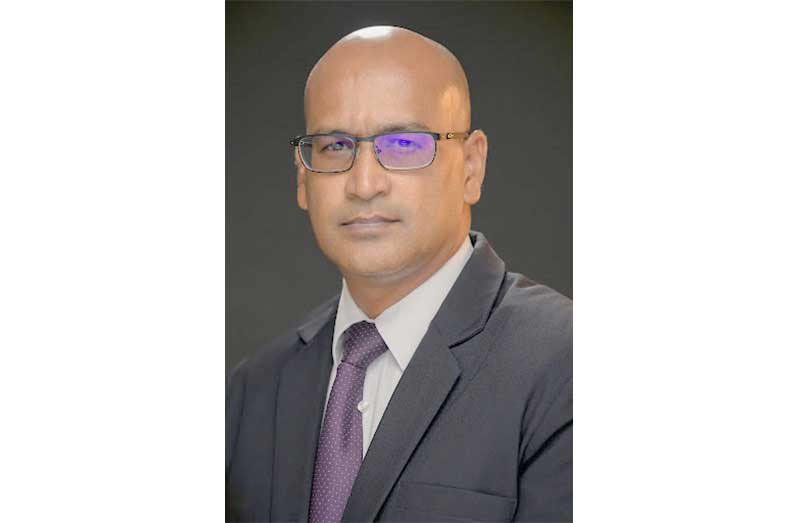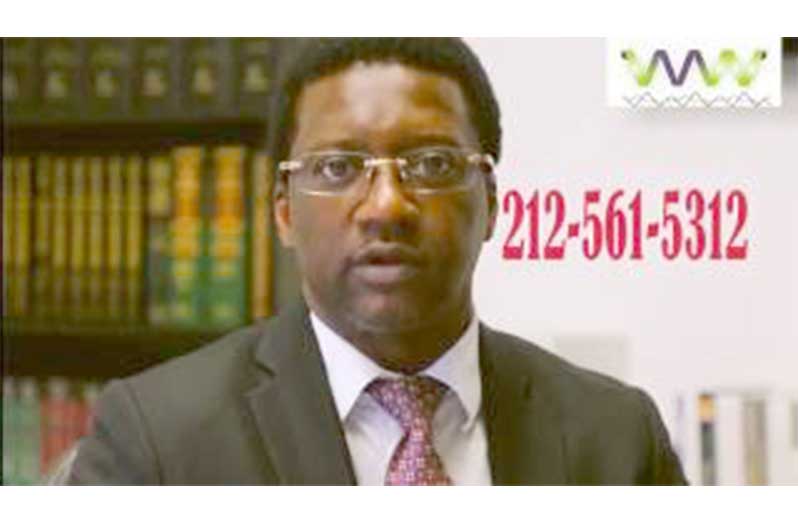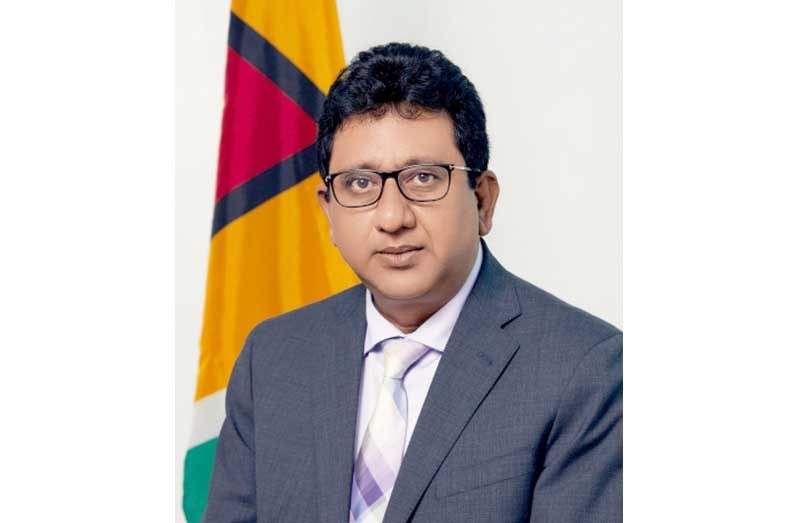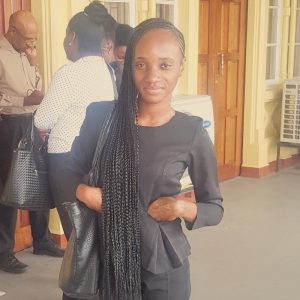-GECOM argues exclusion of parties from certain regions reflects legislative rules, not discrimination
ATTORNEY General and Minister of Legal Affairs, Anil Nandlall, SC, on Tuesday strongly defended Guyana’s proportional representation (PR) electoral framework before the media shortly after presenting arguments in the case filed by the Forward Guyana Movement (FGM).
Last week, FGM, through candidate Krystal Hadassah Fisher, filed a case at the Demerara High Court seeking to block the September 1 General and Regional Elections unless its candidates are included on the ballots in all 10 administrative regions.
FGM’s case, filed by attorney Dr Vivian Williams, centres on its exclusion from Regions Seven, Eight, and Nine, where the party is not contesting Regional Democratic Councils (RDCs) seats.
The party argued that the Guyana Elections Commission’s (GECOM) practice of excluding parties from regions where they are not contesting RDCs seats is unconstitutional, discriminatory, and undermines proportional representation. FGM wants the court to rule that any elections without its inclusion on all regional ballots are null and void.
The challenge also cited the omission of Assembly for Liberty and Prosperity (ALP) ballots in Regions One, Two, Eight, and Nine during the general elections.
Providing a synopsis of his submissions presented before Chief Justice (ag) Navindra Singh, Nandlall said he deliberately began his arguments by tracing the historical evolution of Guyana’s electoral system for the benefit of international observers and the press present in court.

“There was a distinct impression, I believe, conveyed, that our system is somehow flawed and somehow denies registered electors the right to vote. And I feel that that’s completely wrong,” he stated.
According to the Attorney General, Guyana’s system has been refined over decades—from the first-past-the-post model before independence, to proportional representation, then regional elections in 1980, and later the addition of geographic constituencies in 2001.
He noted several cases that had challenged different aspects of the system, including Richardson v. GECOM, Ramkissoon v. Attorney General, and Christopher Jones v. GECOM, noting that “all those cases were dismissed, and the system as it now exists was upheld.”
Turning to the present challenge, Nandlall described it as “perhaps the most misconceived one of all the challenges that have been made against the system.”
While acknowledging that the applicant acted “with the greatest of good intentions,” he argued there was “a lack of understanding of how the system works.”
He explained that the framework provides every elector with two votes: one in a geographic constituency and another for RDCs. Votes cast in the geographic constituencies, he said, are also counted toward the national top-up list. “If you don’t have a vote in the geographic constituency, then you don’t have a vote in the national top-up,” Nandlall clarified.
He emphasised that the country is divided into 10 geographic constituencies, corresponding to the administrative regions. Of the 65 parliamentary seats, he said that 25 come directly from those geographic constituencies while the remaining 40 are drawn from a national “top-up” list.
Rejecting FGM’s claims that Amerindians in Regions Seven, Eight, and Nine would be disenfranchised, the Attorney General stressed that those citizens “will vote—they will just not vote for a party that is not contesting in those regions.”
He argued it was the applicant’s party itself that chose not to contest those constituencies. “It is the party, in my view, that is discriminating against two-thirds of Guyana. It’s not the other way around,” he asserted.
Concluding, Nandlall said he walked the court through the relevant constitutional provisions to demonstrate that the current electoral system is both lawful and fair. “The case is without merit,” he affirmed.
ACTED WITHIN THE LAW
GECOM’s lawyer Arudranauth Gossai emphasised before Justice Singh that the commission has acted fully within the law and that the applicant’s claims are based on a misunderstanding of legislative requirements.
His arguments closely aligned with those of the Attorney General.
He explained that under Section 11(b) subsection 2 of the Representation of the People Act (RoPA), political parties are required to submit candidate lists for each geographic constituency.
Gossai explained that GECOM can only include on the ballot papers for geographic constituencies those political parties that have submitted candidate lists for those areas. He noted that FGM had not submitted lists for certain regions and, as a result, could not be included.

He also clarified that the presidential candidate is elected from the national “top-up” list, not from the geographic constituencies, citing precedent from the Caribbean Court of Justice (CCJ).
“So, if a party chooses not to contest geographic constituencies, it does not receive a vote for the national ‘top-up’ list. The national ‘top-up’ list is not independent; it depends on the geographic list,” he emphasised. He compared the situation to FGM choosing the basic Zoom package but expecting GECOM to place it on the premium package.
Addressing claims that GECOM’s actions were discriminatory or unconstitutional, Gossai argued that the ommission’s decisions are consistent with both the letter and spirit of the law.
He added that, “GECOM is a body created by the constitution with specific rules to follow. [Williams] has not pointed to a single section of RoPA or the constitution that GECOM has failed to comply with or has refused to comply with.”
The lawyer further explained that the commission’s role is to maintain electoral integrity and ensure compliance with statutory provisions, including the preparation and publication of candidate lists for all 10 geographic constituencies, as was done on July 23.
Referencing various legal precedents, including cases challenging other electoral and legislative frameworks, Gossai maintained that the law is consistent with the Constitution of Guyana and protects the rights of voters and political parties alike. Like the Attorney General, he recommended that the court dismiss the FGM application with substantial costs, arguing that the challenge is without merit and could disrupt the upcoming elections.
BREACHES THE LAW
Attorney Williams presented arguments challenging GECOM’s practice of excluding parties from certain geographic constituencies, claiming it breaches the constitution and sections 11 and 39 of the RoPA.
Williams argued that the commission’s interpretation restricts party lists to regions where candidates are contesting, undermining proportional representation and voter rights.
He maintained that he believes GECOM is in breach of RoPA and the constitution, while emphasising that ROPA itself is not in conflict with the constitution.
“RoPA is, in my humble opinion, [is] not inconsistent with the constitution. What is inconsistent with the constitution is GECOM’s application of RoPA.”
The FGM is made up of three distinct political entities: Forward Guyana (FG), The People’s Movement (TPM), and the Vigilant Political Action Committee (V-PAC). FG is led by attorney Amanza Walton-Desir, TPM is headed by Apostle Nigel London, while the V-PAC is chaired by businessman Dorwain Bess. The case resumes this morning with additional arguments from FGM.
Justice Singh has underscored his intention to deliver a ruling before the week’s end.


.jpg)











